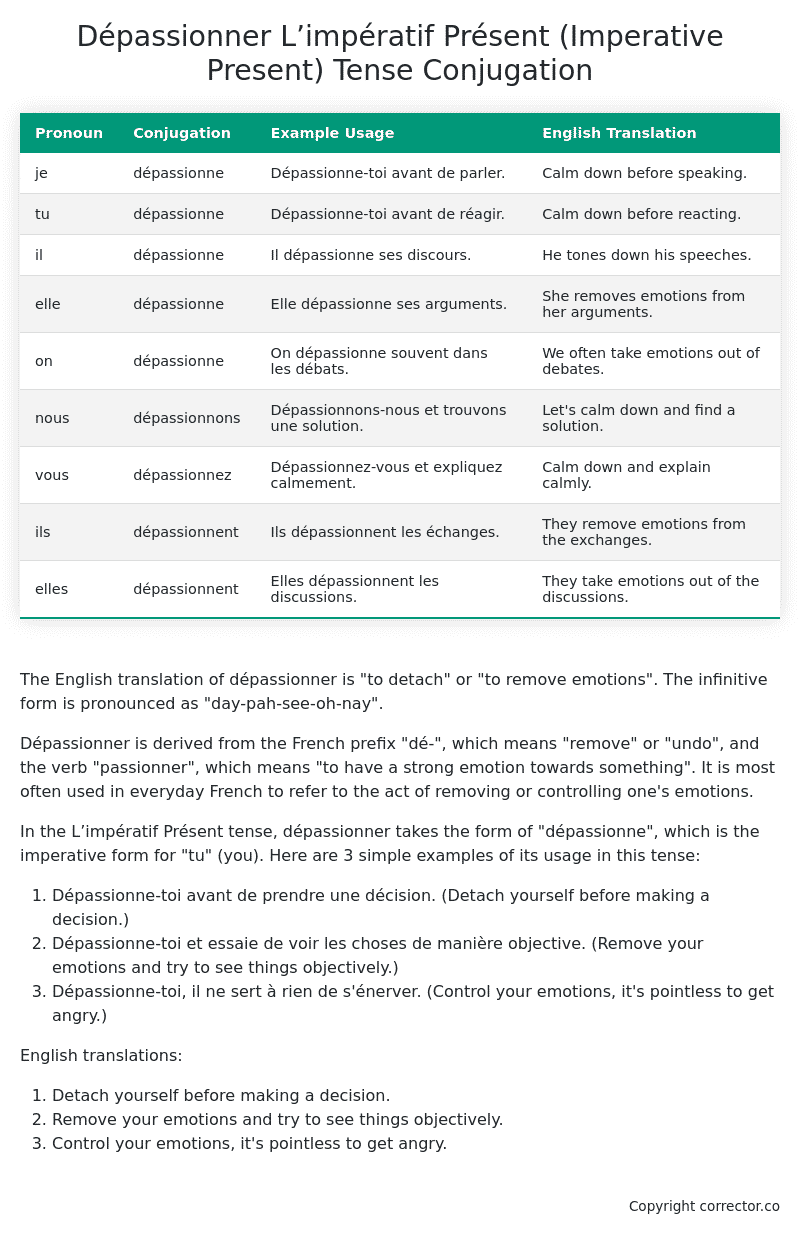L’impératif Présent (Imperative Present) Tense Conjugation of the French Verb dépassionner
Introduction to the verb dépassionner
The English translation of dépassionner is “to detach” or “to remove emotions”. The infinitive form is pronounced as “day-pah-see-oh-nay”.
Dépassionner is derived from the French prefix “dé-“, which means “remove” or “undo”, and the verb “passionner”, which means “to have a strong emotion towards something”. It is most often used in everyday French to refer to the act of removing or controlling one’s emotions.
In the L’impératif Présent tense, dépassionner takes the form of “dépassionne”, which is the imperative form for “tu” (you). Here are 3 simple examples of its usage in this tense:
- Dépassionne-toi avant de prendre une décision. (Detach yourself before making a decision.)
- Dépassionne-toi et essaie de voir les choses de manière objective. (Remove your emotions and try to see things objectively.)
- Dépassionne-toi, il ne sert à rien de s’énerver. (Control your emotions, it’s pointless to get angry.)
English translations:
- Detach yourself before making a decision.
- Remove your emotions and try to see things objectively.
- Control your emotions, it’s pointless to get angry.
Table of the L’impératif Présent (Imperative Present) Tense Conjugation of dépassionner
| Pronoun | Conjugation | Example Usage | English Translation |
|---|---|---|---|
| je | dépassionne | Dépassionne-toi avant de parler. | Calm down before speaking. |
| tu | dépassionne | Dépassionne-toi avant de réagir. | Calm down before reacting. |
| il | dépassionne | Il dépassionne ses discours. | He tones down his speeches. |
| elle | dépassionne | Elle dépassionne ses arguments. | She removes emotions from her arguments. |
| on | dépassionne | On dépassionne souvent dans les débats. | We often take emotions out of debates. |
| nous | dépassionnons | Dépassionnons-nous et trouvons une solution. | Let’s calm down and find a solution. |
| vous | dépassionnez | Dépassionnez-vous et expliquez calmement. | Calm down and explain calmly. |
| ils | dépassionnent | Ils dépassionnent les échanges. | They remove emotions from the exchanges. |
| elles | dépassionnent | Elles dépassionnent les discussions. | They take emotions out of the discussions. |
Other Conjugations for Dépassionner.
Le Present (Present Tense) Conjugation of the French Verb dépassionner
Imparfait (Imperfect) Tense Conjugation of the French Verb dépassionner
Passé Simple (Simple Past) Tense Conjugation of the French Verb dépassionner
Passé Composé (Present Perfect) Tense Conjugation of the French Verb dépassionner
Futur Simple (Simple Future) Tense Conjugation of the French Verb dépassionner
Futur Proche (Near Future) Tense Conjugation of the French Verb dépassionner
Plus-que-parfait (Pluperfect) Tense Conjugation of the French Verb dépassionner
Passé Antérieur (Past Anterior) Tense Conjugation of the French Verb dépassionner
Futur Antérieur (Future Anterior) Tense Conjugation of the French Verb dépassionner
Subjonctif Présent (Subjunctive Present) Tense Conjugation of the French Verb dépassionner
Subjonctif Passé (Subjunctive Past) Tense Conjugation of the French Verb dépassionner
Subjonctif Imparfait (Subjunctive Imperfect) Tense Conjugation of the French Verb dépassionner
Conditionnel Présent (Conditional Present) Tense Conjugation of the French Verb dépassionner
Conditionnel Passé (Conditional Past) Tense Conjugation of the French Verb dépassionner
L’impératif Présent (Imperative Present) Tense Conjugation of the French Verb dépassionner (this article)
L’infinitif Présent (Infinitive Present) Tense Conjugation of the French Verb dépassionner
Struggling with French verbs or the language in general? Why not use our free French Grammar Checker – no registration required!
Get a FREE Download Study Sheet of this Conjugation 🔥
Simply right click the image below, click “save image” and get your free reference for the dépassionner L’impératif Présent tense conjugation!

Dépassionner – About the French L’impératif Présent (Imperative Present) Tense
Usage
Giving commands
Making requests
Offering advice
Expressing desires
Conjugation Formation
Interactions with other tenses
Want More?
I hope you enjoyed this article on the verb dépassionner. Still in a learning mood? Check out another TOTALLY random French verb conjugation!


